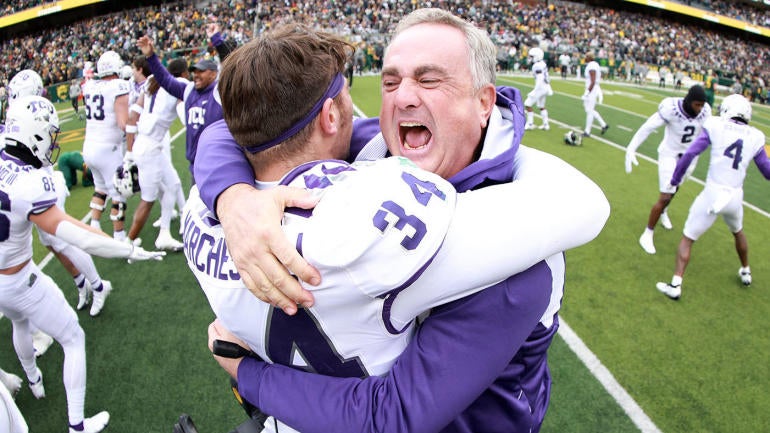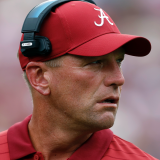
TCU's unlikely run to national championship game serves as blueprint for success in player empowerment era
Coach Sonny Dykes used a top-to-bottom approach that may be necessary to succeed in the modern era

LOS ANGELES — Few coaches have ever had the kind of success in their first season with a program that Sonny Dykes has experienced at TCU. And if the No. 3 Horned Frogs beat No. 1 Georgia on Monday night in the College Football Playoff National Championship, Dykes will become just the fourth coach in college football history to end that first campaign with a national title. TCU's run has been unlikely but well-documented, but the seeds of 2022's success were planted by a coach, and a staff, that wanted to make one thing clear from the beginning: This was a player-led operation.
With player empowerment being one of the biggest ongoing stories in the sport, it's fitting that the team garnering so much attention and adoration has described itself as a player-led group -- and is led by a coach who supports those ongoing changes in college football.
"I'm probably in the minority in terms of my belief that anything that's good for the players, I view, is a good thing," said Dykes during Saturday's CFP media day. "And so NIL makes things complicated. It benefits the players. I think it's a good thing. Transfer portal [is] complicated, hard for coaches. Good for players -- can be, assuming guys make good decisions. I'm for it.
"So, I think, that's always been our thing is the game is changing daily," he continued. "And it's my job to adapt and not only keep up but try to be in front of those changes and to try to use every opportunity to make our team better and our program better. And, so, all those things I really, truly see as positives. I think it's all about player empowerment. I'm a big believer in that."
But Dykes didn't win over the team by his support of NIL or the transfer portal. He and his staff built up players throughout the offseason, spring practice and fall camp, making it clear that if they were going to do anything special with this first season, the players would have to set the example.
Dykes put in the work, too, like a one-off drop-in to the home of Quentin Johnston shortly after taking the job simply to meet with the star wide receiver's family and discuss the upcoming year. His message to the entire team during those first weeks and months brought a sense of calm to a group that had become fractured amidst the uncharacteristic losing that had taken place in the previous 5-7 season.
"He just seemed at peace," said TCU cornerback Tre'vius Hodges-Tomlinson, recalling his first impressions of Dykes. "He came in and told us, 'This is our team. This is a player's team and he's here to make the calls.' And he has been able to adjust to us and build a new culture because at first we were all over the place.
"We were kind of separate teams divided a little bit because that comes with losing," he continued. "So for them to come back and bring everybody back together, I feel like everything was just at peace. For him to come in and say that he's here for us was big."
Dykes assembled a staff that would share in this philosophy -- not just personable position coaches, like cornerbacks coach Carlton Buckels, but also support staff that have played a huge role in building up the confidence in each and every player. Kaz Kazadi oversees the strength and conditioning program as Assistant Athletics Director for Football Human Performance, and his messages extend beyond the archetypal physical demands; he's challenged the Horned Frogs to consider emotional flexibility and mental health.
That focus on the emotional and mental side of the game paid off in the handful of TCU's dramatic second-half comebacks this seasons, sure, but senior offensive lineman Steve Avila saw a change in this group right away in the first game of the season. Trailing 3-0 at the end of the first quarter at Colorado, TCU did not fall back into old habits of panicking and complaining. The team kept its cool and outscored the Buffs 38-10 the rest of the way in a 25-point win.
"At the beginning of this year, even with the first game when things went bad, I looked back at the year before and I'd see people panic and do all these different things," said Avila. "That first game I really didn't see panic on everybody's face. We kept our head on our shoulders. I feel like that's what we did at halftime. Every game we were down. Nobody was panicking, complaining about anything."
From it's on-field versatility to its off-field approach of player empowerment and establishing a cohesive unit, TCU is an example of the top-to-bottom approach that may be necessary to succeed in the modern era. It's paid off with a group that never gets too high or too low, and developing healthy mental and emotional habits have powered this amazing run. There are voices across college football who fear the change in the power dynamic between coaches and players, but Sonny Dykes and TCU have shown what a championship-level team looks like in the modern era of player empowerment.


















